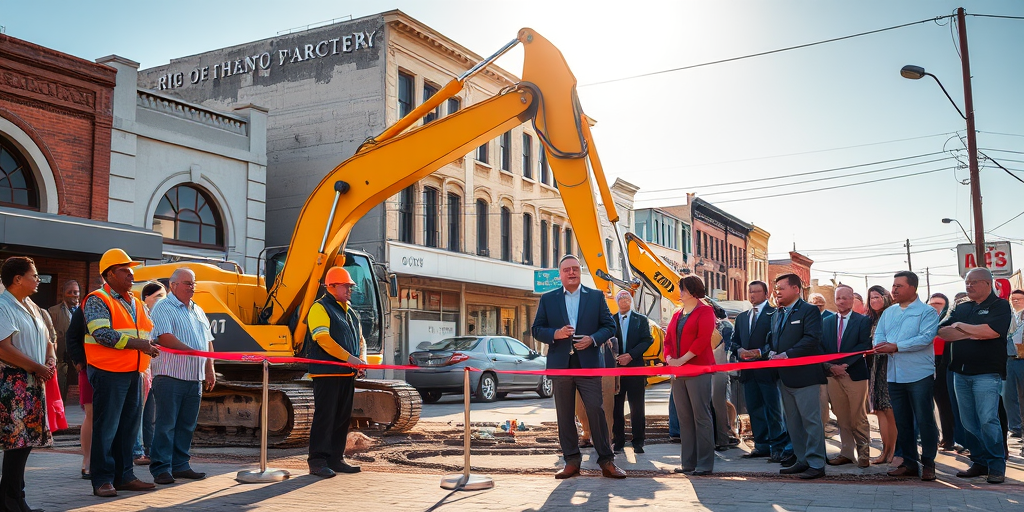McAllen’s New Drainage Project: A Milestone in Flood Management
The City of McAllen is celebrating a major advancement in its infrastructure as officials and community members gathered for the ribbon-cutting ceremony of a highly anticipated drainage project. Completed at a cost of over $1 million, this project aims to address flood risks that have impacted the region historically, marking a significant investment in regional water management and safety for Valley residents.
Project Overview and Significance
The newly completed drainage project is strategically located on the northwest side of McAllen, a region historically prone to flooding during heavy rains. “The region, during 2018, experienced some localized flooding,” noted McAllen City Engineer Eduardo Mendoza. “This project covers a big area. [It] will provide regional support from here on Auburn [Avenue] down south to Trenton [Road], west from Ware Road, all the way east to 33rd Street.”
The project entails a comprehensive upgrade of over 5,500 feet of the ditch, along with the construction of a sophisticated Regional Detention Facility designed to efficiently collect runoff water. Chosen based on geographical need and available space, this site will play a crucial role in stormwater management, reducing the threat of future flood events.
Contextualizing the Project: A Result of Community Advocacy
The decision to prioritize and fund this drainage project stems from a significant civic pushback following the 2018 bond election. City leaders responded to Valley residents’ concerns about recurring floods by backing the proposal financially and logistically, viewing it as an essential part of broader efforts to fortify the city’s infrastructure.
The newly completed drainage system is one of 18 projects initiated as part of this ongoing commitment to flood relief. Commissioner Arturo Reyes highlighted, “These projects are indicative of the progress we aim to achieve in addressing our community’s longstanding vulnerabilities to flooding. It’s a step towards ensuring homes and businesses are better protected.”
Broader Impacts on the Rio Grande Valley
For the Rio Grande Valley—a region known for its dramatic weather patterns, including heavy rainstorms and hurricanes—this project signifies hope and resilience. As Valley residents grapple with the impacts of climate change, which exacerbate flooding risks, such infrastructural improvements are pivotal in safeguarding the community.
“This development underscores how local impact can be maximized through strategic planning and investment,” said Dr. Alicia Hernandez, a civil engineer with expertise in stormwater management. “Projects like these demonstrate foresight, equipping the region to handle significant rainfall without succumbing to catastrophic flood events.”
Future Implications and Next Steps
With the drainage project now operational, McAllen is poised to see immediate and long-term benefits—not just in mitigating flood damage but also in improving overall quality of life. Reduced flooding can lead directly to the stability of property values and enhance the attractiveness of the Valley for new residents and investors.
Regional leaders hope that the success of this project will serve as a prototype for similar initiatives across South Texas, inspiring widespread adoption of advanced water management systems. As population growth continues, and development accelerates across the RGV, infrastructure needs will become increasingly pressing.
However, balancing these advancements with financial sustainability remains a challenge. On this front, city planners and financial stakeholders must keep assessing strategies to maintain and possibly expand these essential services without straining public finances.
Community Resources and Involvement
In a bid to maintain transparency and community involvement, the City of McAllen has announced a series of community workshops and open days at the Regional Detention Facility. Such engagements are vital to ensuring residents understand the functionality, limitations, and capabilities of the system put in place. Additionally, the city plans to provide continuous updates and educational materials to help residents stay informed about water safety and flood preparedness.
For further inquiries or to voice concerns, community members are encouraged to reach out to the Engineering Department at (956) 681-1100 or visit the official McAllen city website. Valley residents looking to engage more deeply with flood management discussions can also participate in upcoming town halls detailed on the city’s community calendar.
Conclusion
This completed drainage project in McAllen represents more than just an infrastructure upgrade; it exemplifies the community-first approach that local planners are increasingly adopting in the face of environmental challenges. As officials and residents embrace this new chapter, the outlook for a resilient and sustainable Rio Grande Valley remains positive. With careful planning, community engagement, and ongoing innovation, the RGV continues to lay foundations for future growth and security.







